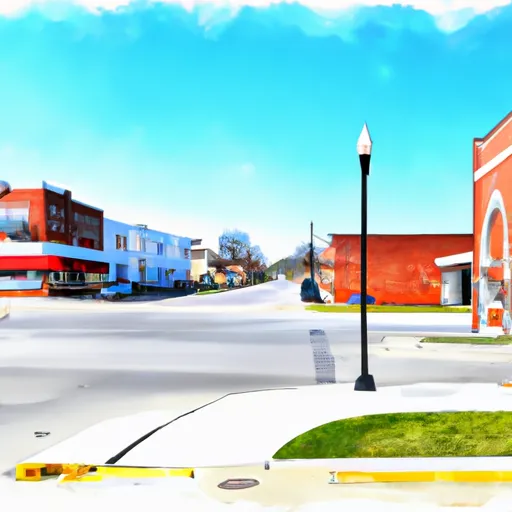-
 Snoflo Premium
Snoflo Premium
Get unlimited access to all our content
With no Ad interruptions! - Start Your Free Trial Login with existing account
Mason
Eden Index
Climate
8.3
•
Recreation
1.1
•
Community
•
Safeguard
3.7/10

Mason, Illinois is a small town located in Effingham County. The town experiences a continental climate, characterized by hot summers and cold winters. Summers are typically humid, with average temperatures ranging from 75°F (24°C) to 90°F (32°C), while winters can be cold and snowy, with average temperatures ranging from 25°F (-4°C) to 40°F (4°C).
Hydrologically, Mason is situated in the Kaskaskia River watershed. The town benefits from an abundance of groundwater resources, with several wells providing water for domestic and agricultural use.
For outdoor enthusiasts, Mason offers various recreational opportunities. The Kaskaskia River runs near the town, providing opportunities for boating, fishing, and wildlife viewing. The nearby Ballard Nature Center offers hiking trails, birdwatching, and educational programs to explore the region's flora and fauna. Additionally, the Mason State Wildlife Refuge is a popular destination for hunting and trapping.
Overall, Mason, Illinois offers a diverse climate, abundant hydrology constituents, and numerous outdoor recreation opportunities for residents and visitors alike.
What is the Eden Index?
The Snoflo Eden Index serves as a comprehensive rating system for regions, evaluating their desirability through a holistic assessment of climate health, outdoor recreation opportunities, and natural disaster risk, acknowledging the profound impact of these factors on livability and well-being.
Climate Health Indicator (CHI): 8.3
Mason receives approximately
1078mm of rain per year,
with humidity levels near 82%
and air temperatures averaging around
13°C.
Mason has a plant hardyness factor of
6, meaning
plants and agriculture in this region thrive during a short period during spring and early summer. Most
plants will die off during the colder winter months.
By considering the ideal temperature range, reliable water supplies, clean air, and stable seasonal rain or snowpacks, the Climate Health Indicator (CHI) underscores the significance of a healthy climate as the foundation for quality living.
A healthy climate is paramount for ensuring a high quality of life and livability in a region, fostering both physical well-being and environmental harmony. This can be characterized by ideal temperatures, reliable access to water supplies, clean air, and consistent seasonal rain or snowpacks.
Weather Forecast
Streamflow Conditions
Wabash
Area Rivers
Wabash
Snowpack Depths
Wabash
Reservoir Storage Capacity
Wabash
Groundwater Levels
Recreational Opportunity Index (ROI): 1.1
The Recreational Opportunity Index (ROI) recognizes the value of outdoor recreational options, such as parks, hiking trails, camping sites, and fishing spots, while acknowledging that climate plays a pivotal role in ensuring the comfort and consistency of these experiences.
Access to outdoor recreational opportunities, encompassing activities such as parks, hiking, camping, and fishing, is crucial for overall well-being, and the climate plays a pivotal role in enabling and enhancing these experiences, ensuring that individuals can engage in nature-based activities comfortably and consistently.
Camping Areas
| Campground | Campsites | Reservations | Toilets | Showers | Elevation |
|---|---|---|---|---|---|
| Archusa Creek Waterpark | 69 | 315 ft | |||
| Twiltley Branch - Okatibbee Lake | None | 421 ft | |||
| Davis Bayou - Gulf Islands National Seashore | 52 | 19 ft | |||
| Maynor Creek Waterpark | None | 362 ft | |||
| Shepard State Park | None | 16 ft | |||
| Stephen A. Forbes State Park | 135 | 604 ft | |||
| Clarkco State Park | None | 273 ft | |||
| Lake Tom Bailey | 32 | 299 ft | |||
| Turkey Fork Rec. Area | 76 | 278 ft | |||
| Dunns Falls Water Park | None | 269 ft |
Nearby Ski Areas
Catastrophe Safeguard Index (CSI):
The Catastrophe Safeguard Index (CSI) recognizes that natural disaster risk, encompassing floods, fires, hurricanes, and tornadoes, can drastically affect safety and the overall appeal of an area.
The level of natural disaster risk in a region significantly affects safety and the overall livability, with climate change amplifying these risks by potentially increasing the frequency and intensity of events like floods, fires, hurricanes, and tornadoes, thereby posing substantial challenges to community resilience and well-being.
Community Resilience Indicator (CRI):
The Community Resilience Indicator (CRI) recognizes that education, healthcare, and socioeconomics are crucial to the well-being of a region. The CRI acknowledges the profound impact of these elements on residents' overall quality of life. By evaluating educational resources, healthcare accessibility, and economic inclusivity, the index captures the essential aspects that contribute to a thriving community, fostering resident satisfaction, equity, and social cohesion.

